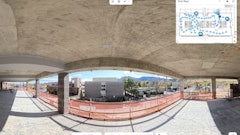
Digital transformation, big data, predictive analytics — these trends have been consistently impacting and driving many industries, including construction. But while the need of technological adoption is undeniable, with large scale projects coming in up to 80% over budget and taking 20% longer to complete than scheduled, is the construction industry overlooking a basic, yet essential, element to delivering projects on time and on budget?
The simple answer is yes. What the construction industry requires are proven cost management strategies built on trust.
Cost management strategies and construction consultancies
The simplicity of the solution to project overrun and delays is grounded in the fundamental function of a construction consultancy firm. Construction consultancies are independent advisors who help prepare and guide clients, like contractors, through the lifecycle of a project. Backed by teams of experts, construction consultancy companies offer specialized knowledge of each stage of a project, as well as experience working with designers, architects, engineers and other associated professionals, to provide full support for their clients.
Consider independent cost management consultants as important assets in a contractor’s tool kit. They implement comprehensive cost management strategies to ensure projects come in on time and on budget. When deployed on behalf of contractors, these plans can mitigate loss and maximize return on investment. By relying on independent and experienced project governance, cost management strategies and construction consultancy firms form the basis of the successful delivery of any construction project.
The evolution of cost construction consultancy
So, if the answer to the ballooning budgets and extended timelines that plague the construction industry is as straightforward as following the basic principles of cost management and independent project oversight, why doesn’t everyone do just that? The truth is that there is still an unrecognized need for cost construction consultancy; a need that has been created as a response to the industry’s current practices and the inability to control costs.
The idea of project management in construction as its own discipline was introduced in the 1950s. During that time, today’s modern project management practices, which employ the critical path method (CPM) and the program evaluation and review technique (PERT), were developed in the United States.
Construction management and leadership thinking has historically originated from the UK, where the European construction management certification system was established and is still used internationally as validation in the construction industry.
Cost management and construction consultancy firms have been in the U.S. for years, but after the global impact of the American financial crisis in 2008, and due to recent heavy construction and the rebuild of structures, the need for businesses to set greater control over budgets and finances became an emerging issue. With changing demands of larger scale projects and growing interest in cost certainty, specialists like quantity surveyors (QS), also known as cost managers (CM), were required to help control project budgets.
In addition to these circumstances, there is an industry-wide issue of low productivity, especially in North America. According to a McKinsey 2017 report, whereas the construction productivity gap resulted in a global economic value loss of $0.46 and $0.44 trillion in Europe and the Asia-Pacific region respectively, North America topped the list with a loss of $0.58 trillion.
One of the main factors that is negatively impacting construction productivity is poor project management and execution. As the region that has cost the global economy the most losses, the North American construction market is in particular need of improved programs like cost management plans that can help address the pressing issues of productivity in the construction industry.
The benefits of cost management strategies
Cost management strategies are vital to construction projects because they aim to establish a budget, which is then closely monitored and controlled. By creating a defined plan and evaluation process, these strategies can help manage cost expectations from project inception to the start of the project. Accurate estimating and strategic planning of costs are significant steps to the creation of a comprehensive cost management program.
Cost certainty and predictability are the ultimate goals of a successful cost management strategy. Monthly reports broken down into costs per building or area, as well as cash flow analysis, provide vital insight into how closely the budget is being followed. Through a continuous review and estimating process, there is enhanced visibility for contractors into the cost and schedule of the entire project.
Risk is also minimized through cost management strategies. In conjunction with the rest of the project team, the CM can estimate the cost of risk throughout the project based on the risk register created by the risk management team or project manager. In this way, a cost manager can assess and advise on the cost based on project plans and past experiences on similar builds.
The resulting combination of current and predictive information allows for a complete picture of existing issues and potential issues that could affect the budget and negatively impact a contractor’s profits.
Building trust
As the shepherds of cost management strategies, cost managers are responsible for overseeing many aspects of the project that directly impact its overall success. The shifting demands in larger scale projects and the adoption of technology in the industry also require a CM to remain technically skilled and knowledgeable.
At the same time, while it is important that they are constantly adapting and upskilling to understand client-specific platforms, cost managers should be able to rely on old-fashioned paper and pen if they are ever called upon for high level budgetary numbers. An ability to balance traditional skills with knowledge in the latest technological advancements helps cost managers create a foundation from which trust can be established.
Being able to rely on a CM’s skill to produce accurate projections and estimates, therefore, becomes a key element to effective cost management strategies.
In a client and cost manager relationship, trust is built on industry experience and reputation. If a contractor can rely on the proven expertise of a CM, then there can be greater confidence in the overall cost management strategy. Communication and transparency further promote this trust. Through constant monitoring of the budget and continuous reporting of progress or changes, cost managers can keep clients informed and increase visibility on current costs and schedule.
Why trust matters
In a digital age where almost all industries are concerned with how their businesses can adapt to technological change, it is important to remember the basic fundamentals of good project management and governance. Relationships built on trust and decisions informed by industry expertise are all vital ingredients to minimizing risk. If the construction industry can move beyond its traditionally fragmented processes and incorporate the experience of more independent, experienced advisors, then it can begin to establish realistic project budgets and schedules.
Rachael Daly is a Commercial Manager at Linesight and a chartered Cost Manager with over 10 years of global experience. She received her Bachelors' degree with honors in Quantity Surveying from the Limerick Institute of Technology. Rachael began her career in Ireland, moving to Australia and the U.S. She has worked in many sectors, including healthcare, residential, retail, rail, government, commercial, industrial, refurbishment and education.



















